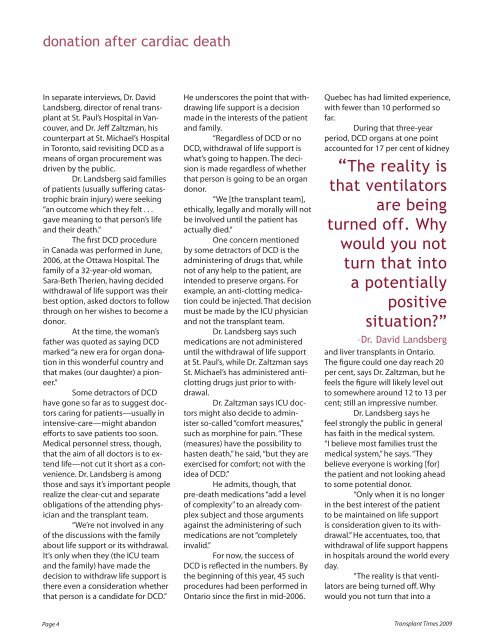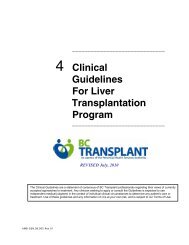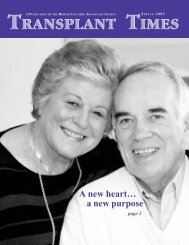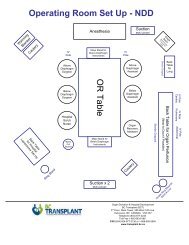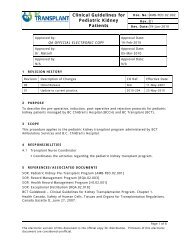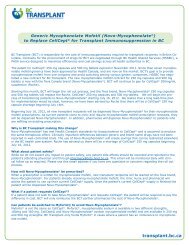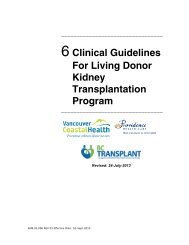Summer 2009 - British Columbia Transplant Society
Summer 2009 - British Columbia Transplant Society
Summer 2009 - British Columbia Transplant Society
Create successful ePaper yourself
Turn your PDF publications into a flip-book with our unique Google optimized e-Paper software.
donation after cardiac death<br />
In separate interviews, Dr. David<br />
Landsberg, director of renal transplant<br />
at St. Paul’s Hospital in Vancouver,<br />
and Dr. Jeff Zaltzman, his<br />
counterpart at St. Michael’s Hospital<br />
in Toronto, said revisiting DCD as a<br />
means of organ procurement was<br />
driven by the public.<br />
Dr. Landsberg said families<br />
of patients (usually suffering catastrophic<br />
brain injury) were seeking<br />
“an outcome which they felt . . .<br />
gave meaning to that person’s life<br />
and their death.”<br />
The first DCD procedure<br />
in Canada was performed in June,<br />
2006, at the Ottawa Hospital. The<br />
family of a 32-year-old woman,<br />
Sara-Beth Therien, having decided<br />
withdrawal of life support was their<br />
best option, asked doctors to follow<br />
through on her wishes to become a<br />
donor.<br />
At the time, the woman’s<br />
father was quoted as saying DCD<br />
marked “a new era for organ donation<br />
in this wonderful country and<br />
that makes (our daughter) a pioneer.”<br />
Some detractors of DCD<br />
have gone so far as to suggest doctors<br />
caring for patients—usually in<br />
intensive-care—might abandon<br />
efforts to save patients too soon.<br />
Medical personnel stress, though,<br />
that the aim of all doctors is to extend<br />
life—not cut it short as a convenience.<br />
Dr. Landsberg is among<br />
those and says it’s important people<br />
realize the clear-cut and separate<br />
obligations of the attending physician<br />
and the transplant team.<br />
“We’re not involved in any<br />
of the discussions with the family<br />
about life support or its withdrawal.<br />
It’s only when they (the ICU team<br />
and the family) have made the<br />
decision to withdraw life support is<br />
there even a consideration whether<br />
that person is a candidate for DCD.”<br />
He underscores the point that withdrawing<br />
life support is a decision<br />
made in the interests of the patient<br />
and family.<br />
“Regardless of DCD or no<br />
DCD, withdrawal of life support is<br />
what’s going to happen. The decision<br />
is made regardless of whether<br />
that person is going to be an organ<br />
donor.<br />
“We [the transplant team],<br />
ethically, legally and morally will not<br />
be involved until the patient has<br />
actually died.”<br />
One concern mentioned<br />
by some detractors of DCD is the<br />
administering of drugs that, while<br />
not of any help to the patient, are<br />
intended to preserve organs. For<br />
example, an anti-clotting medication<br />
could be injected. That decision<br />
must be made by the ICU physician<br />
and not the transplant team.<br />
Dr. Landsberg says such<br />
medications are not administered<br />
until the withdrawal of life support<br />
at St. Paul’s, while Dr. Zaltzman says<br />
St. Michael’s has administered anticlotting<br />
drugs just prior to withdrawal.<br />
Dr. Zaltzman says ICU doctors<br />
might also decide to administer<br />
so-called “comfort measures,”<br />
such as morphine for pain. “These<br />
(measures) have the possibility to<br />
hasten death,” he said, “but they are<br />
exercised for comfort; not with the<br />
idea of DCD.”<br />
He admits, though, that<br />
pre-death medications “add a level<br />
of complexity” to an already complex<br />
subject and those arguments<br />
against the administering of such<br />
medications are not “completely<br />
invalid.”<br />
For now, the success of<br />
DCD is reflected in the numbers. By<br />
the beginning of this year, 45 such<br />
procedures had been performed in<br />
Ontario since the first in mid-2006.<br />
Quebec has had limited experience,<br />
with fewer than 10 performed so<br />
far.<br />
During that three-year<br />
period, DCD organs at one point<br />
accounted for 17 per cent of kidney<br />
“The reality is<br />
that ventilators<br />
are being<br />
turned off. Why<br />
would you not<br />
turn that into<br />
a potentially<br />
positive<br />
situation?”<br />
–Dr. David Landsberg<br />
and liver transplants in Ontario.<br />
The figure could one day reach 20<br />
per cent, says Dr. Zaltzman, but he<br />
feels the figure will likely level out<br />
to somewhere around 12 to 13 per<br />
cent; still an impressive number.<br />
Dr. Landsberg says he<br />
feel strongly the public in general<br />
has faith in the medical system.<br />
“I believe most families trust the<br />
medical system,” he says. “They<br />
believe everyone is working [for]<br />
the patient and not looking ahead<br />
to some potential donor.<br />
“Only when it is no longer<br />
in the best interest of the patient<br />
to be maintained on life support<br />
is consideration given to its withdrawal.”<br />
He accentuates, too, that<br />
withdrawal of life support happens<br />
in hospitals around the world every<br />
day.<br />
“The reality is that ventilators<br />
are being turned off. Why<br />
would you not turn that into a<br />
Page 4 <strong>Transplant</strong> Times <strong>2009</strong>


